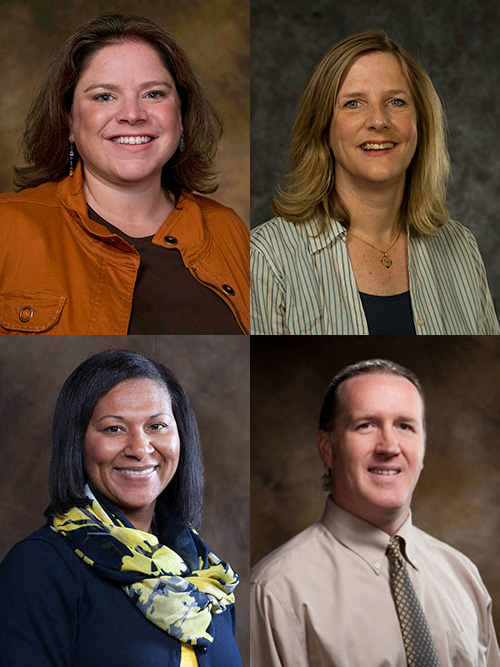FAYETTEVILLE, Ark. – Four University of Arkansas professors have been awarded grants totaling $2.75 million over the next five years to fund tuition, fees, stipends and travel expenses for master’s students in rehabilitation counseling in the College of Education and Health Professions.
Brent Thomas Williams, associate professor of rehabilitation education and research, received a $1 million grant to support master’s students in the general area of rehabilitation counseling.
Lynn Koch, professor of rehabilitation research and education, and Kristin Higgins, associate professor of counselor education, received a $750,000 grant to support master’s students studying to become psychiatric rehabilitation specialists.
Stephanie Lusk, assistant professor of rehabilitation education and research, received a $1 million grant to support master’s students in rehabilitation counseling who want to work in the field of substance abuse. Lusk’s grant assisting students who want to work in addictions counseling is the first of its kind for the U of A.
Each of the three grants will support seven U of A graduate students each year.
The funding – called traineeship grants – comes from the Rehabilitation Services Administration of the U.S. Department of Education. The College of Education and Health Professions has received about $10 million in these grants since 2002.
“These grants represent a continuation of the phenomenal success our rehabilitation counseling program has had in securing federal funds to support graduate students,” said Tom Smith, dean of the College of Education and Health Professions. “The program is nationally ranked at No. 16 by U.S. News & World Report and has been in the top 20 for more than a decade. Dr. Williams, the program coordinator, is also leading PROMISE, a $32.4-million, five-year project funded by the U.S. Department of Education that will improve the education and career outcomes of low-income teens with disabilities in Arkansas. We are proud of this program for its efforts to put students first and to serve the state, as well to prepare rehabilitation professionals who are leading human-service agencies and university programs all over the United States.”
Both master’s students already enrolled in the rehabilitation program and students applying for admission to the program now are eligible to apply for the grants. Students interested in applying for the general rehabilitation grants should contact Williams at btwilli@uark.edu or 479-575-8696. Those interested in applying for the psychiatric rehabilitation grants should contact Koch at lckoch@uark.edu or 479-575-5824 or Higgins at khiggi@uark.edu or 479-575-3329. Those interested in applying for the grants focusing on substance abuse should contact Lusk at sluskhe@uark.edu or 479-575-5817.
Students who apply for the grant received by Koch and Higgins must be committed to working in the field of psychiatric vocational rehabilitation counseling. For Lusk’s grant, the requirements, in addition to those set by the Graduate School and the rehabilitation program, are that applicants complete a course that focuses on addiction and demonstrate a commitment to working with consumers, either in treatment facilities or vocational rehabilitation agencies, who have substance abuse disorders.
After graduation, students who receive the traineeship grants will be required to work two years for a state vocational rehabilitation agency or a service provider contracted by a state agency for every one year they receive the funding. They will be obligated to pay the money back if they don’t fulfill that requirement.
This is the fifth such grant Williams has received since joining the faculty of the College of Education and Health Professions in 2002. The competition was steep this application period because the Rehabilitation Services Administration had suspended funding the traineeship grants for four years before beginning again, he said.
“These grants assist us in recruiting some of the best graduate students who want to work in the field of rehabilitation counseling,” Williams said. “The funding helps our program continue to remain strong by providing resources that allow the faculty to pursue not only training but also research endeavors.”
Koch and Higgins’ grant will increase the number of rehabilitation specialists who can assist people with mental illness. In Arkansas, 21.3 percent of residents have a mental illness and Arkansas’ rates of serious psychological distress among people between the ages of 18 and 25 are among the highest in the United States, according to the National Survey on Drug Use and Health for 2008 and 2009. The unemployment rate for Arkansans with psychiatric disabilities was 78.8 percent in 2012, the Substance Abuse and Mental Health Services Administration reported.
“It is imperative that we prepare professionals with the knowledge, attitude and skills needed to provide quality rehabilitation services to individuals with psychiatric disabilities,” Koch said. “Students in the training program will have a unique curricular program of study with special emphasis on recovery-oriented, evidence-based practices. Consistent with the mission of recovery-oriented psychiatric rehabilitation, this training program is based on the principle that people with psychiatric disabilities should have broad-based life options available to them with opportunities for employment and independent living in keeping with their needs, preferences and rights.”
Lusk focuses on rehabilitation counseling for people with disabilities who also are experiencing substance abuse issues.
“Sometimes, people with a disability may self-medicate with alcohol or drugs or they may substitute these substances if they can’t afford their prescription medication,” she said. “They think it will relieve the symptoms related to their disability, but it usually makes their condition worse. Some addictions treatment facilities have vocational rehabilitation counselors on staff, but they are few and far between. There definitely needs to be more. Also some vocational rehabilitation agencies have counselors who work specifically with individuals who have substance use disorders. We hope our students will be interested in working at these facilities and working with these consumers.”
Topics
Contacts
Brent Thomas Williams, associate professor of rehabilitation education and research
College of Education and Health Professions
479-575-8696,
Lynn Koch, professor of rehabilitation education and research
College of Education and Health Professions
479-575-5824,
Heidi Wells, content writer and strategist
Global Campus
479-879-8760,
